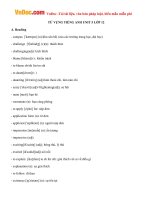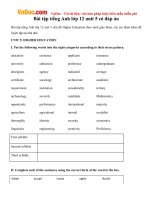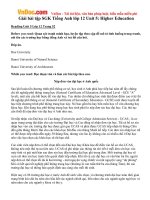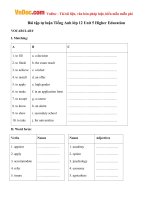Bài giảng Tiếng Anh lớp 12 Unit 5: Higher education (Listening) - Trường THPT Bình Chánh
Bạn đang xem bản rút gọn của tài liệu. Xem và tải ngay bản đầy đủ của tài liệu tại đây (760.83 KB, 15 trang )
TRƯỜNG THPT BÌNH CHÁNH
Unit 5:
Part C: Listening
BEFORE YOU LISTEN
1.
2.
3.
4.
5.
6.
7.
8.
9.
proportion /prəˈpɔːʃn/ (n)
: tỷ lệ, sự cân đối
majority /məˈdʒɒrəti/ (n)
: đa số
tutorial /tjuːˈtɔːriəl/ (a)
: (thuộc) gia sư
international /ˌɪntəˈnæʃnəl/ (a):quốc tế
available /əˈveɪləbl/ (a)
: sẵn sàng, rỗi (người)
appointment /əˈpɔɪntmənt/ (n) : cuộc hẹn
agricultural /ˌỉɡrɪˈkʌltʃərəl/ (a):(thuộc) nơng nghiệp
rural /ˈrʊərəl/ (a)
: (thuộc) nơng thơn
thoroughly (adv) = completely: hồn tồn
/ˈθʌrəli/
/kəmˈpliːtli/
Checking vocabulary: MATCHING
1. proportion (n)
2. majority (n)
3. tutorial (a)
4. international (a)
5. available (a)
6. appointment (n)
7. agricultural (a)
8. rural (a)
9. thoroughly (adv)
a. sẵn sàng, rỗi (người)
b. quốc tế
c. (thuộc) nông nghiệp
d. đa số
e. (thuộc) nơng thơn
f. hồn tồn
g. cuộc hẹn
h. tỷ lệ, sự cân đối
i. (thuộc) gia sư
WHILE YOU LISTEN
Task 1: Listen to the conversation between John and David and
circle the best option (A, B, C or D) to complete the following
sentences
1. David used to be _______.
A. an international student
B. a tutor at the university
C. a student at the university
D. a lecturer at the university
2. In his department,_______.
A. many students came from other countries
B. some students came from other countries
C. the international students did not like the course
D. the international students did not study well
5
3. David thinks the most important thing for the international
students is _______.
A. not to be shy to talk to other students
B. to make an appointment with local students
C. to make full use of the tutors and lecturers
D. not to tell anyone their problems
4. David advises the international students to_________ at the
beginning of the course.
A. find out when the tutor is available for tutorial appointments
B. make full use of their friends
C. share studying experiences with local students
D. know as much as they can about the university
6
5. In order to deal with the long reading lists David advises the
international students to _______.
A. read all the items on the reading list
B. read the most important items on the reading list
C. find out the most important reading list
D. ask local students for the most important reading list
7
Task 2: Fill in each blank with suitable words to complete the
conversations.
John: Now David, can I get this right. You've just completed a
MSc course on which a (1) _____ proportion of the students
were international students? Is that right?
David: That's it. Yes, I was in AERD, that's the department of
Agricultural Extension and (2) ______ Development.
John: And how do you think the students from other countries
got along on that course?
David: Pretty well.
8
John: What advice would you give students, particularly
international students, based on your (3) _________ as a
student here?
David: I think the most (4) ____ thing is to make use, full use,
of the tutors and lecturers. Maybe some of the overseas students
are a bit too (5) ____ to take questions or problems to tutors.
John: What do you think they should do?
David: I think they should find out at the beginning of the
course the time at which the tutor is going to be (6) _________
for tutorial appointments and then make full use of them.
9
John: So, any problems, they should tell the tutor as soon as
possible? Let's move on, what about the amount of reading that
you have to do as a university student?
David: Yes. It looks pretty (7) _________ at first, with those
long reading lists. Don't think that the students have to read
everything that’s listed. Try to find out which are the most
important items on the list - ask the lecturer or tutor if necessary,
and then, if your time is (8) ________, spending it reading those
books thoroughly.
John: OK, that’s very (9) ________, David. Thank you very
much.
David: No, not at all.
10
AFTER YOU LISTEN
Ask and answer the questions
“Would you prefer to do an undergraduate
course abroad or in your country?”
Explain your choice.
11
Exercise 1: Fill in each blank with a suitable preposition
1. The students from other countries got ______on that course.
2. His advice was based ___ his own experiences as a student here.
3. We found ____ later that we had been at the same school.
4. Grants should be available ____ all students.
5. Before moving ______, does anyone have any questions they
would like to ask?
6. ___first, I thought he was joking but then I realized he meant it.
12
Exercise 2: Mark the letter A, B, C, or D on your answer sheet to
indicate the word(s) CLOSEST in meaning to the underlined word(s)
in each of the following questions.
1. GCSE are not compulsory, but they are the most common qualifications
taken by students.
A. required
B. applied
C. fulfilled
D. specialized
2. He’s really delighted with his success.
A. pleased
B. angry
C. entertained D. annoyed
3. If you understand a matter thoroughly, that means you understand it ___.
A. hardly
B. hard
C. completely D. scarcely
4. Read this article thoroughly and you will find out the inappropriate
points presented in it.
A. cover
B. discover
C. recover
D. coverage
13
HOMEWORK
- Listen again the conversations at home
- Review the vocabulary
- Prepare the next lesson









